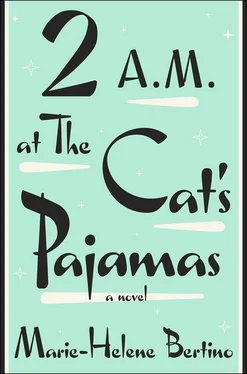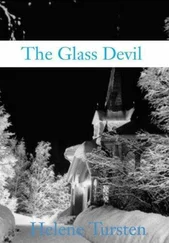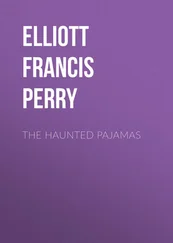The glasses in the cupboards, the cookbooks, the recipe box, hover a foot off their perches. The dish towels ascend above their wooden rods.
“What is this?” Corrine says.
The voice is oblivious to the mayhem it’s causing.
Mark stumbles into the back bedroom to find their baby clutching the bars of her crib. She is singing. He halts, scared to approach this unfamiliar creature. Madeleine holds the last, joyful note. Mark lifts her out of her crib and returns to the family room, where everything is collapsing. Corrine dodges the kitchen items that have been abandoned by their arrangements with gravity. Mark silences the music.
Finally, everything is still. They gape at Madeleine, who bounces and claps in Mark’s arms. “Order a pizza?” Mark says finally.
Corrine laughs. “What I wanted to begin with.”
When Madeleine sings, everyone gets what they want.
Almost everyone.
Every morning Mark wakes up thinking Corrine is still alive. Every morning he finds her side of the bed empty and suffers the loss again.
Madeleine has her mother’s formidable nose, the brown eyes that always seem on the verge of tears. Mark wants to love his daughter, but being around her makes him miss his wife more. Madeleine is only what is left. Mark glides a book underneath his sleeping daughter’s hand. History of Jazz, Volume Two . When she wakes, at least there will be something good waiting.
Lorca palms his son’s shoulder. “Come outside with me and smoke a cigarette.”
Alex blanches at his father’s touch. Laughter shivers through his friends. “I’m fine, Pop.”
“Alex,” Lorca says.
Aruna says she’ll come too, but Lorca stops her. “You will stay here in this bar while I go outside to speak with my son.” He leads Alex through the vestibule where well-dressed people fight their coats off. He rattles his pack, but Alex doesn’t want one. The Second Street Bridge is lit in green and red. Alex is taller than him but would be no match for a gust of wind.
Lorca remembers what it’s like to be sixteen and feel bigger than the city. “You coming by on Christmas?”
Alex doesn’t meet his father’s eyes. “Of course, Pop.”
He has practiced this aloofness, but Lorca knows he cries at movies if an animal is injured. “I’ll cook. Roast chicken.”
“Since when do you cook?” Alex says.
“Since never.”
“Will Louisa be there?”
Lorca kicks at the grass snarling out of the sidewalk. “Louisa left me.”
“She told me,” Alex says.
In the doorway, one girl asks another if there’s a cover. “Beats me,” her friend says.
“There’s no cover,” Lorca calls out.
They stop, blondes in tweed coats, and glare at him.
“I know you don’t like her,” Alex says. “But can I bring Aruna?”
“It’s Christmas. Everyone’s invited.”
“I keep forgetting it’s Christmas.”
“You and me both.” Lorca smells the brine of the river. The swipe of his son’s cheap cologne. “A cop came by this morning and told us that unless we pay thousands of dollars the club will be closed.”
“Sonny told me,” Alex says.
Lorca sighs. “I guess he told everyone.”
Alex stiffens at the word everyone . “All the same to me,” he says. “Not like I can play here anyway.”
Lorca has again said the wrong thing, forcing up the wall between them. A pummeled feeling leans against him. In every apartment on every street in this city there are better fathers, but not one of them has a more gifted son. “How old are you?” he says.
“Sixteen.”
“How old?”
Alex spits. “Sixteen, Pop. I get it. I’m too young.”
“Alex.” Lorca’s gaze is even. “Someone might ask how old you are tonight and if they do, what do you say?”
Alex swallows hard. “Twenty-four.” If he celebrates, his father will change his mind. He innately knows his father’s moods and tendencies the way you know on a flight, even with your eyes closed, that a plane is banking. So he races to the door. His hand slips on the handle because his body won’t let him go as fast as he wants.
His father calls his name.
Alex turns back to the man smoking on the sidewalk. Please don’t take this away from me . People jostle by while he hangs in the doorway, waiting for his father to speak.
“Don’t get cocky,” Lorca says. “I’d go with twenty-one.”
Alex vanishes into the club, leaving his father alone on the street.
Ben orders two whiskeys and two Churchills and pats his legs dry with bar napkins. Sarina makes flimsy promises to herself in the ladies’ room mirror. She will have one drink, total. Two. She will have two drinks and the third will be water. She will ask about Annie. She will not mention Annie. She will not cross her legs for effect. She will absolutely cross her legs every five seconds. She will not, under any circumstances, call anything “transcendent.” She will keep her ever-loving shit together. Even if he touches her cheek. Which he has already done three times. Why does he touch her cheek so much? Is he someone who touches people’s cheeks or is it her cheek specifically? She touches her cheek. Not bad.
Here stands Sarina in the mirror of a cigar bar, reminding herself that there is no color skirt she can wear that would make Ben single. There is no way she can fix her hair, no perfume on earth, no story amusing enough. Even if she wishes in this mirror for an hour, this night will end with a good-bye and a bowl of ice cream with cherries. She is obvious and see-through and a joke. She will never leave this bathroom. He’ll be confused initially but then will return to his life. She will live here, teach via telephone, knit in the evenings. They will say, Remember that night Georgie had a dinner party and Sarina decided to live in the bathroom? She will die here, next to this decorative toilet paper decanter and that vintage cat poster. People will say, they will say, people will say.
A jiggling sound. A stranger tries the door.
Sarina checks her watch.
Madeleine sings into a pale silver microphone, her favorite instrument the stand-up bass running like a low-grade fever in and out of the rooms of her dreams.
In the back room of The Cat’s Pajamas, Alex suits up. He wants his father to hear him and know he can play. Not only hear him, but hear him.
“No.” John McCormick halts his little sister, who was going for the door again.
Jill returns to her chair. She stabs at her wooden duck with a paintbrush filled with Winter Grain Green. It is impossible to concentrate on her mallard when her parents are fighting. Her other brother, Norman, paints the belly of his Northern Pintail with Stone Cottage Gray. John paints his duck with John-like caution. He pauses between applications to consider the ruckus in the other room, or to give a gentle no to his sister, who wants to go in and soothe. But then they’d get in trouble for not being in bed, or worse.
On the other side of the door, their parents use words like whore and dickhead .
“Do you think my duck is sad?” Jill says.
“North American mallards,” John pretends to read, “are among the world’s happiest ducks. When winter comes, they fly in happy families to Latin America.”
Jill readjusts her glasses. She considers her duck with this new information. Steve, she’s named him. “Steve?” she tests.
The unmistakable sound of a slap makes even John place his brush down on the palette. “Don’t go in there,” he says, before Jill even leaves her chair.
Читать дальше












